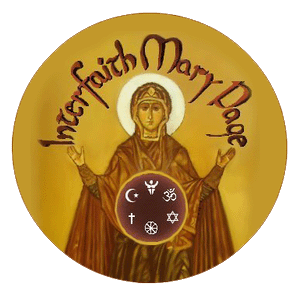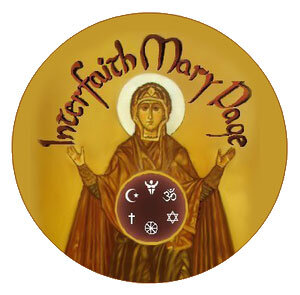Mother Mary And Martin Luther
Luther's grave and memorial plaque in Wittenberg with other plaques next to his
Martin Luther (like most theologians) condemned any Christian who regards Mary as equal to Jesus or who implies that Jesus alone is somehow incomplete without a feminine expression of God by his side. This is what patriarchal training taught his mind to think.
His heart on the other hand, seems to have known that it did indeed need a heavenly mother along with its heavenly father. And so he confessed: "The veneration of Mary is inscribed in the very depths of the human heart." (Sermon, Sept. 1st 1522)
If one believed Rev. Peter Stravinskas, then this inscription on his heart would be reflected in the inscription on his tomb. Stravinskas published a generally good article on "The Place of Mary in Classical Fundamentalism", but I'm afraid his source made one pious mistake: It maintains that the relief of the Coronation of the Virgin and inscription by Peter Vischer the Younger which is to be found in the Wittenberger Schlosskirche, where Luther is buried, goes with Luther's tomb. I wish it were so, but actually it is the memorial plaque for Henning Göde, the last Catholic Prior of the church, who died in 1521, right during the most turbulent time of Luther’s Reformation.
One might credit all the generations of Protestants who took no offense with this very Catholic plaque right next to Luther’s and left it there.
Generally Luther was against any invocations of saints and against asking for their intercession. But Mother Mary, whom he was happy to call the Mother of God, was a case apart, unlike any other saint. This is probably because he recognized the Biblical precedent for Mary’s intercession. After all, at the wedding in Cana, she obtained help from Jesus for the party even though her son tried to resist her nudging. (John 2 :1-11) No wonder that Catholics say, Jesus can’t refuse the requests of his mother. Maybe that’s why even: “Calvin happily called Mary the “treasurer of grace.” See Matthew J. Milliner’s article “Everybody’s Mother”.
Henning Göde's memorial plaque photos: Ella Rozett
“In the resolutions of the 95 theses Luther rejects every blasphemy against the Virgin and thinks that one should ask for pardon for any evil said or thought against her.” He preached on Mary on all her feast days, more so than most Catholic priests do today. This custom was continued for about a century after Luther’s death. He was also comfortable with keeping celebrated images of Mary in his churches where they remained until the time of “Enlightenment” in the 18th century.
What did Luther think of the most famous Marian prayers? He directed that the Magnificat be sung daily in all churches. He conceded that the Hail Mary could form part of a healthy prayer life, though he doubted most believers’ ability to pray it with the correct attitude. But the Hail Holy Queen and the Queen of Heaven he condemned as extravagant and “unevangelical”.
Luther quotes on Mary:
"(She is the) highest woman and the noblest gem in Christianity after Christ … She is nobility, wisdom, and holiness personified. We can never honor her enough. Still, honor and praise must be given to her in such a way as to hurt neither Christ nor the scriptures." (Sermon, Christmas, 1531)
"It is the consolation and the superabundant goodness of God, that humanity is able to exult in such a treasure. Mary is its true Mother …" (Sermon, Christmas, 1529)
"Mary is the Mother of Jesus and the Mother of all of us, even though it was Christ alone who reposed on her knees… If he is ours, we ought to be in his situation; there where he is we ought also to be, and all that he has ought also to be ours, and his mother is also our mother." (Sermon, Christmas 1529)
"People have crowded all her glory into a single phrase: The Mother of God. No one can say anything greater of her, though he had as many tongues as there are leaves on the tress." (From the Commentary of the Magnificat)
"God did not receive his divinity from Mary, but it does not follow that it is therefore wrong to say that God was born of Mary, that God is Mary’s Son, and that Mary is God’s mother. … She is the true mother of God and bearer of God. … Mary suckled God, rocked God to sleep, prepared broth and soup for God, etc. For God and man are one person, one Christ, one Son, one Jesus, not two Christs… just as your son is not 2 sons… even though he has two natures, body and soul, the body from you, the soul from God alone." (On the Councils of the Church, 1539)
Luther believed in Mary’s perpetual virginity and in her Immaculate Conception. Only the latter he didn’t think should be a dogma that people are obliged to believe.
"It is a sweet and pious belief that the infusion of Mary’s soul was effected without original sin; so that in the very infusion of her soul she was also purified from original sin and adorned with God’s gifts, receiving a pure soul, infused by God; thus from the first moment she began to live she was free from all sin." (Sermon, "On the Day of the Conception of the Mother of God", 1527)
"…she is full of grace, proclaimed to be entirely without sin… God’s grace fills her with everything good and makes her devoid of all evil… God is with her, meaning that all she did or left undone is divine and the action of God in her." (Luther’s Works, ed. H. Lehmann, Fortress Press, 1968, vol. 43, p.40)
"We can use the Hail Mary as a meditation in which we recite what grace God has given her. Second, we should add a wish that everyone may know and respect her." (Personal Prayer Book, 1522)
Modern Protestant thinkers on Mary:
Reinhard Kirste, founder of an interfaith organization of the Protestant Church in Germany, pointed out to me that since the 1970’s Protestant theologians, especially feminist ones, have been rediscovering a deep appreciation for the Mother of Christ. Many are very careful not to become too “Catholic” in their relationship to the Virgin, but all concede that she has a special closeness to God and would be a good example to emulate.
Here are three examples:
* Elisabeth Moltmann-Wendel / Hans Küng / Jürgen Moltmann, Was geht uns Maria an? GTB 493. Gütersloher Verlagshaus, Gütersloh: 1988
*Rosemary Radford Ruether, Mary – The Feminine Face of the Church, The Westminster Press, Philadelphia: 1977.
*Basilea Schlink, The Mother of Jesus, Marshall Pickering, London: 1986



